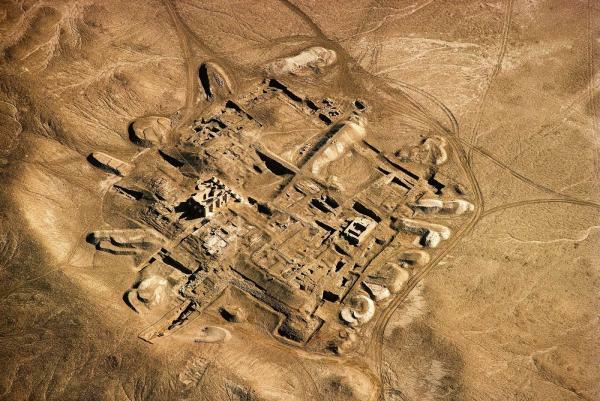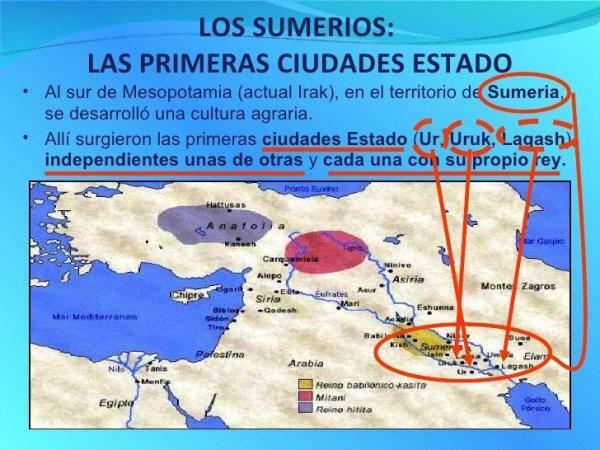How the first cities in history arose

Image: Warehouse of classics - blogger
Nowadays it seems strange to us at least to live in small villages, because our society and therefore way of Life revolves around the city, a place where the centers of political, social and economic power are found. But since when do cities exist? Why were they created? In this lesson from a TEACHER we will talk about how the first cities in history arose focusing on the most characteristic elements of these first large cities and who inhabited them.
The Middle East is the geographical area where the first great civilizations in history will take place, along with India and China.
Within our lesson on how the first cities in history arose, we will focus on a process that took place in the Neolithic, between the 6000-5000 BC C. period in which the first signs of agriculture and domestication of livestock. In this other lesson we will discover what the first agrarian civilizations.
Prior to this, the populations of this area were nomads, being small tribes scattered throughout the geography, although the place preferred by these to have a "base camp" were the mountain areas of the Taurus and the Zagros (in the north of the Near East). It was from that moment, with the beginning of agriculture and the appearance of cattle, when the populations found themselves in the need to go down to flatter places where they could
expand crop fields.Within this large geographical area, we will now go on to talk about Mesopotamia, whose name means "between two rivers" and that is where the first cities in history would emerge. We can say that this place has three types of terrain along its entire breadth:
- At first, we will meet the mountainous areas, which were steep places, where there are torrential and seasonal rains, and where there is hardly room to settle (for a large group).
- Next, we move on to a plateau, where the earth is clayey (Mud being the material par excellence of the Near East), the problem of this place is that the distance between the two rivers (Tigris and Euphrates) left an arid land in the middle.
- Sumer, named for being the first part of the earth to be “civilized” at the hands of the Sumerians. It's a land very fertile, where the rivers end up flowing into the Persian Gulf.

Image: Slideshare
We come to the most important section in our lesson on how the first cities in history arose, therefore, we will focus on the population group of the Sumerians. This town, after the discovery of agriculture, was moving through the rest of the geography until reaching what we know as Sumeria, in lower Mesopotamia.
It was there that this long process began to germinate, which we can divide into several parts:
- At first, the tribes left settling around the temples, that it was the most important place within the population nucleus (the Sumerians above all are very believers and need the activities of the gods to explain everything that happens around them).
- Then the big priests, they took control of the cropsIn this way, all the farmers had to leave the result of their work in the temple granary and it would be this one that would distribute it after equitably, leaving a surplus as an offering of the population to the divinity, in addition to making sure to save surplus in case "cows came skinny ”.
- The third and most important point is in the year 3000 a. C. date we know the writing appears. An invention that is closely linked to the temple. Well, that was where it appeared, since it was a tool to count what they had stored in the temple, although later it would serve to communicate other types of elements.
In this other lesson from a TEACHER we will discover the cuneiform writing of the Sumerians.

Once the writing appears, we can talk about civilizationIt is also the moment in which specialists appear, that is, people who are exempt from working in the field, because they have other duties. Among them, we will mention the most important:
- Scribes: people who wrote everything that was indicated to them, used to create dynasties, that is, the trade passed from parents to children and on many occasions we will find that many of these also belong to the clergy.
- Soldiers: they were the defenders of the city, in a historical period, where the jealousy between the populations was very close to the skin, this meant, that if One city rose above the others, was in danger of being envied and therefore, there would be possible invasions or races to take over everything. new. Hence, it was decided to create a specialized defense body.
- KingAlthough in Sumer, he was better known as the lord, his main purpose was to provide the defense of the city, being the leader of the soldiers. He is subordinate to the city and in this civilization, he is the mere chief of the armies of the god of the city (the city belongs to the god).
- Craftsmen: people who perform certain types of work with their hands, working with clay, stone, wood, leather, textiles,…. What they have in common is that they worked for the temple at first.
All these groups have one thing in common and it was that received payment for their activitiesThat is, from the harvesting of the harvest, they took a percentage without having to work in the field.
That is why this period is called specialization, and it is when they appear, when we can talk about civilization, since a complex society is created, in which each one has some obligations.


